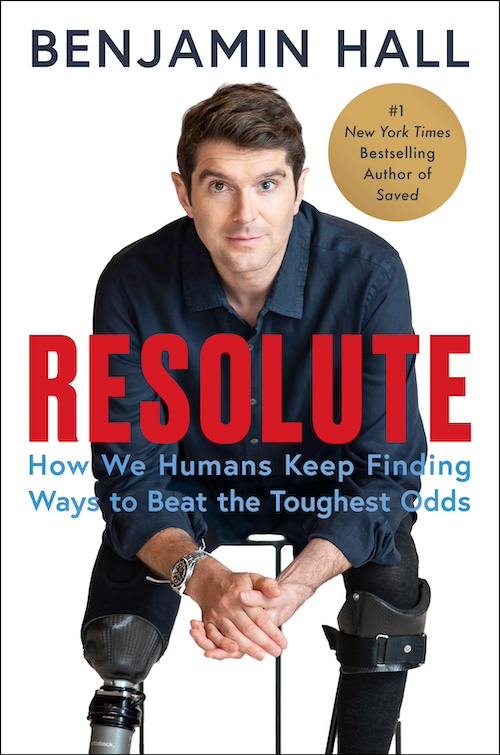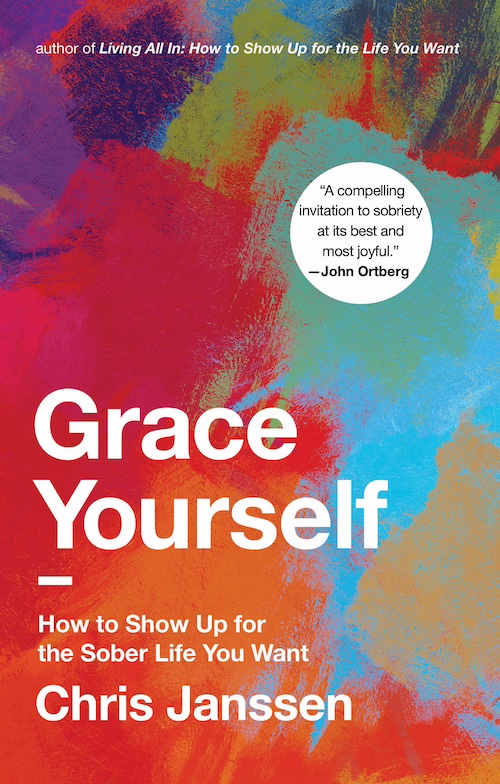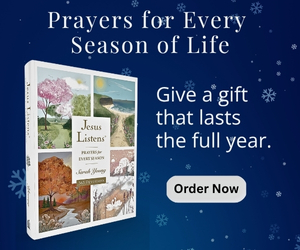Rising Up From Our Lowest Moments: Benjamin Hall & Chris Janssen
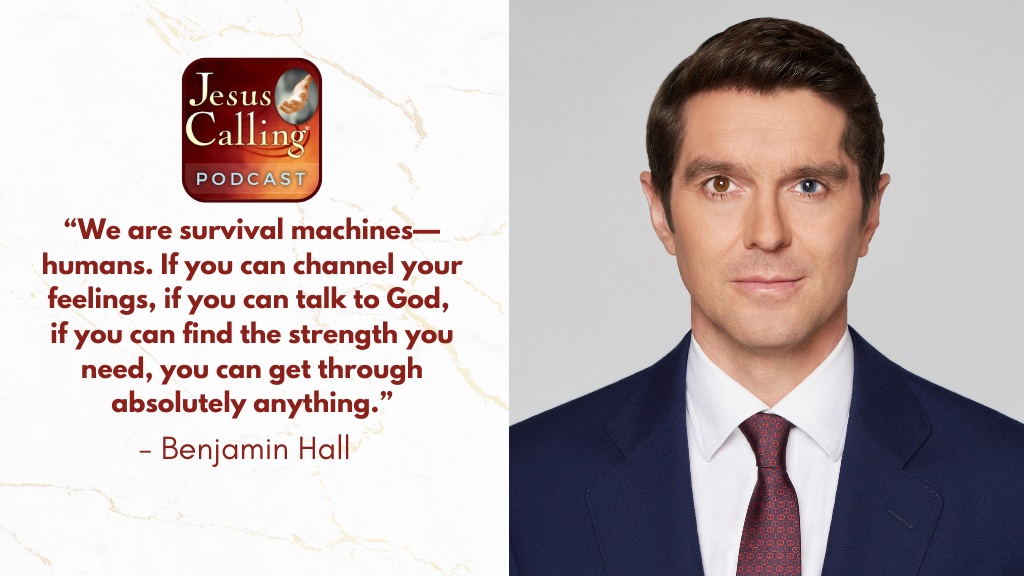
This episode contains mature content.
Benjamin Hall: I honestly believe that resilience is in absolutely everyone. Everyone has it. And if you can channel your feelings, if you can talk to God, if you can find the strength you need, you can get through absolutely anything.
Rising Up From Our Lowest Moments: Benjamin Hall & Chris Janssen – Episode #466
Narrator: Welcome to the Jesus Calling Podcast. This week, we’ll hear from seasoned journalist Benjamin Hall, who has spent much of his career reporting from some of the world’s most dangerous conflict zones. In 2022, while covering the war in Ukraine, he was gravely injured in an attack that killed two of his colleagues. Today, he shares how that harrowing experience challenged his limits and instilled in him the unshakeable belief that we all have the strength to overcome—no matter what we face.
Later in the episode, we’ll hear from author and life coach Chris Janssen as she shares her firsthand experience with alcoholism and the path to recovery. Now, through her journey of sobriety, Chris uses the lessons learned from her lowest moments to help others rise to new heights.
Let’s begin with Benjamin Hall.
Benjamin Hall: I’m Benjamin Hall, and I’ve been a war correspondent for my whole career covering conflicts around the world in Afghanistan, Syria, Somalia, Iraq, Libya, and many others.
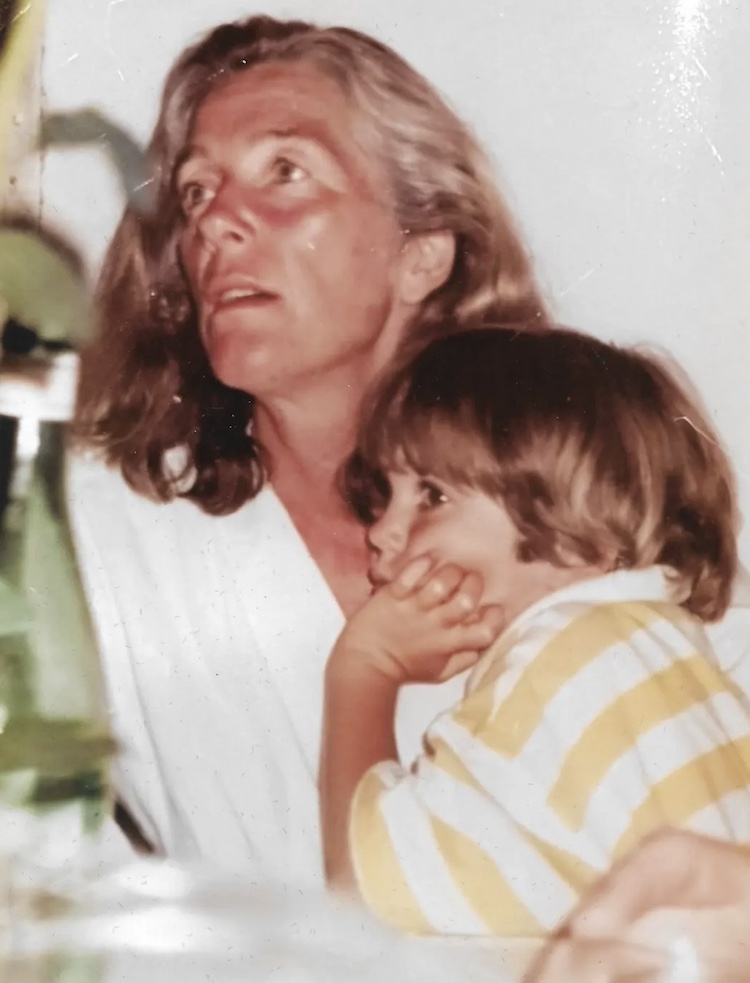
I was born in London, in the UK. My mother was English and my father was American. My parents were very different from one another. My mother was really very creative. She loved to travel the world. She loved to try and meet people who she would otherwise never normally have met. We grew up going to places like Brazil and fishing on the Amazon or tenting in Africa or staying with tribes in Venezuela. I think from her I learned the excitement of meeting new people, traveling to new places, and discovering the world in general.
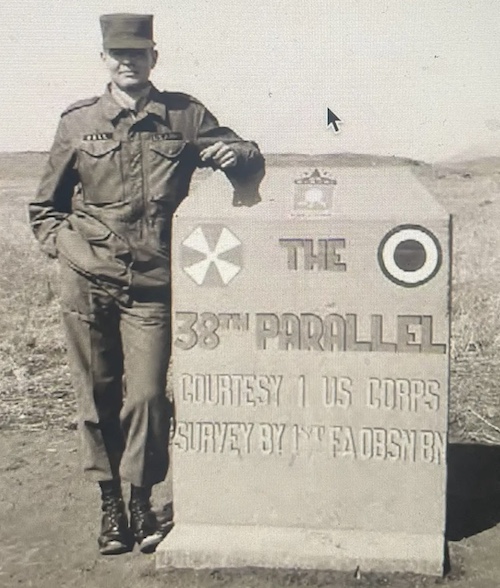
My father, on the other hand, was more serious. He was very rational. He was a businessman. And his own experiences as a child really affected who I was as well. He was born in the Philippines during World War II, and he was in a Japanese prison camp for a while from the age of eight years old. His mother, his aunts, and his grandparents were killed. At the end of the war, when the American soldiers came back in to liberate the country, my father, who was twelve years old at the time, was living on the streets, and he rushed with his siblings to find the American soldiers because he had been told, “If you want to stay alive, you find the Americans. They will save you.” He did, and I grew up with this story that my father always told me about how when he finally found the American front line, he ran towards the soldiers and this GI from the Ohio National Guard picked him up, pulled him behind a tank, and said, “We got you now, we got you.”
My father moved to the United States, went to college, then he enlisted and served in the US Army in Korea. From the day that he was saved by an American soldier on the streets of Korea, he was just the proudest American out there. I was raised with his idea that we must always be out there trying to save others, trying to do what we can, and you must always look at the good, and you must look at the bad, and you must learn from both of them.
A Harrowing Reporting Assignment in Ukraine
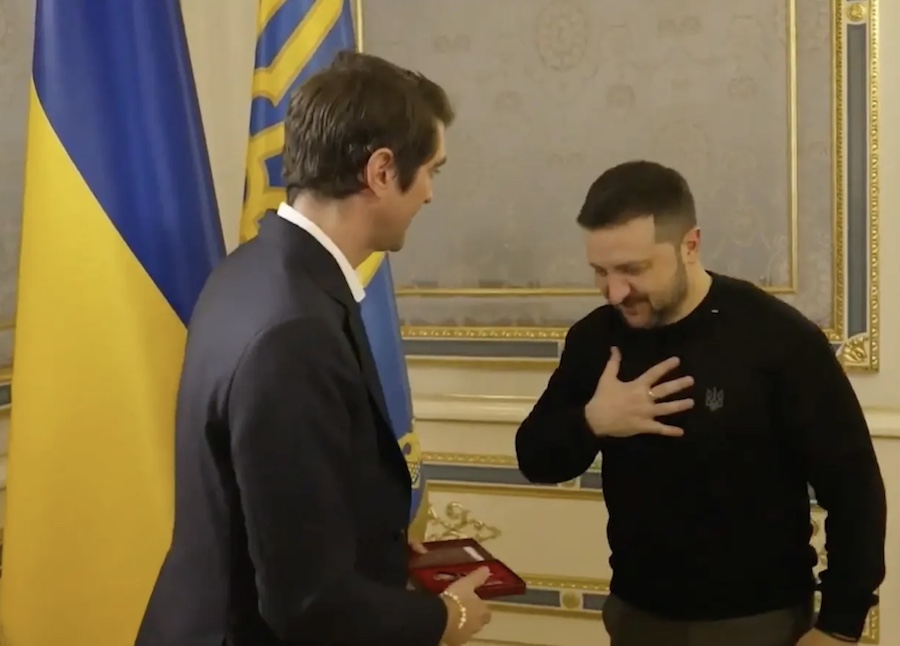
Three years ago, we were covering the war in Ukraine at the beginning of the conflict. It was March 14th, and the Russians were surrounding the capital city of Kyiv. We had finished filming, and we were driving back towards Kyiv in our car. It was me, our cameraman, Pierre, our local fixer called Sasha—twenty-one years old—and two Ukrainian soldiers who were driving us in a civilian car. We came up to this abandoned checkpoint, and as the car slowed down to turn around this checkpoint, phew! Our team was hit by Russian artillery.
The first one landed about thirty feet in front of us. We quickly tried to reverse the car, and a few seconds later, the second one landed just alongside the car. And that one blacked me out. I think I got shrapnel in my eye at that point and some head injuries. I went into this place of total dark, total peace, total quiet, almost like another world. It was into this moment, into this totally black place, that I saw right in front of me my seven-year-old daughter, Anna, who spoke to me and said, “You’ve got to get out of the car, you’ve got to get out of the car, you’ve got to get out of the car.” And she brought me back. I came back, and my eyes opened, and suddenly everything around me was chaotic. There were some flames. I grabbed for the side door of the car, and I took one step out of the car, and the third shell hit the car itself. I was thrown away, and I was unconscious for a little bit, and when I woke up, I was on fire. My right leg was largely missing, injuries from head to toe. I started rolling around to try and put the flames out. Finally, I sat down, in and out of consciousness for a bit, and our cameraman, Pierre, was a little bit ahead of me. He had gotten out of the car, and he just said, “Russian drones, don’t move, Russian drones.”
So, we lay there for a bit. I’m trying to figure out if I’m gonna survive, and I thought about my family. I told myself that, No matter what, I’m gonna find a way to get back to them. And then, the next thing I thought about after that was a prayer to God. And I said, “God, please somehow get me home again.” And the next forty minutes or so, I lay there. No one knew exactly where we were. Pierre passed away while I was there. The other three died in the car. And after a long wait, Ukrainian Special Forces drove past, but they didn’t see me. I was waving at them and screaming at them, and they still didn’t see me.
Amazingly, that one car had engine problems just down the road, and it turned around and came right back up. By that point, I was higher up, and I had a handful of rocks. I threw them up at this car, and they saw me and pulled me into the car. It was at that very moment that I felt all the pain. With the adrenaline and everything else while I was lying there, I hadn’t felt the pain, but the moment I was saved, that was the moment that the pain all kicked in.
A Daring Rescue, A Painful Path Toward Home
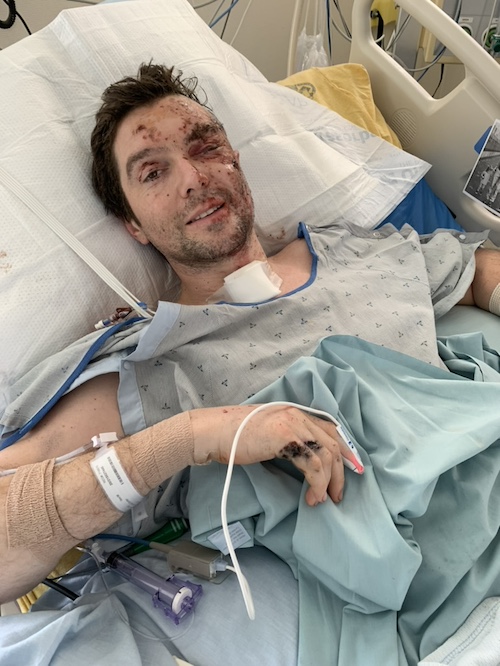
I remember when I woke up, I was lying in this hospital bed, and I assumed I’d been taken by the Russians. I was trying to think, All right, how do I escape from this hospital? Fox News had learned that our team had been hit. They knew one person survived, but they didn’t know who. They hired this incredible group called Save Our Allies, American veterans who were nearby in Poland, to come into Ukraine to try and find me.
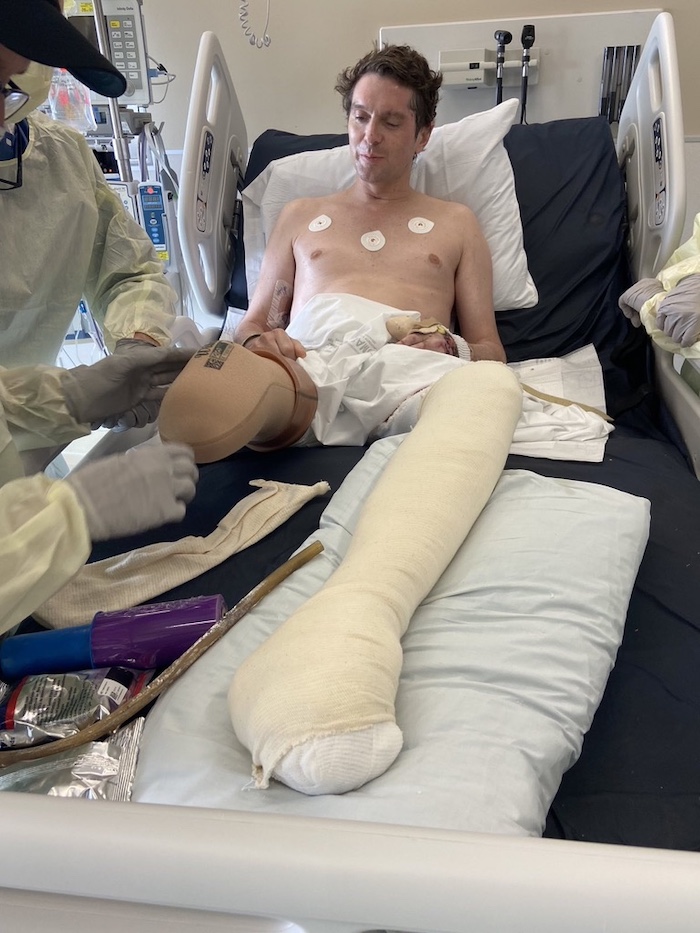
They finally found the hospital I was in, and they managed to evacuate me. I had a big piece of shrapnel in my neck they couldn’t remove, so they couldn’t drive me out because they were worried about how bad the roads were. They couldn’t fly me out because of surface-to-air missiles. But then, amazingly, it turned out that the Polish prime minister was on the first ever secret visit since the war began. If we could get through the curfew and break through at night time, then the prime minister would evacuate me on his train. And so began this incredible journey where we went checkpoint to checkpoint. Ukrainians actually thought that we were Russians coming in and that we were breaking the curfew. They would open up my wounds and there were guns at the head as we were trying to get our way through Kiev to try and get to the prime minister on time. Then, with minutes to spare before the train left, we managed to get there, and they put me onto this train. And then began this ten-hour train ride to Poland, which was probably the hardest thing I’ve ever done in my life because they had no pain meds for me.
I just lay there for ten hours, and I had to find another level of strength inside me to make the pain stop. I’d also learned on that train journey that Pierre and Sasha had been killed, and I had to deal with those feelings as well.
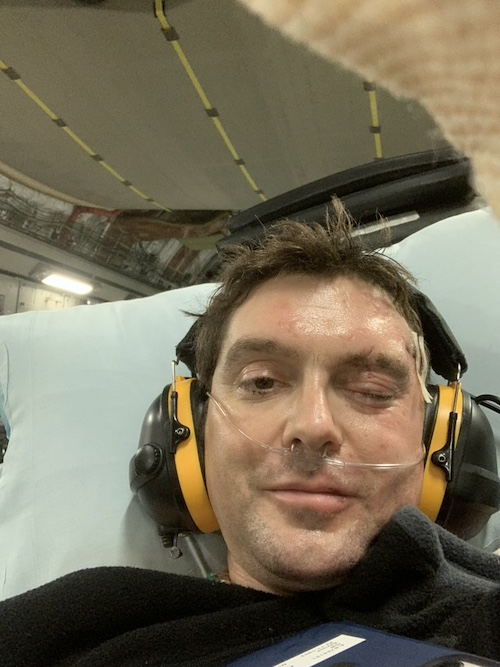
Honestly, it was during that ride that I learned how much your mind can influence how you are feeling and how you can find another level of strength when you have to. Every time the pain was becoming too much to bear, every time I thought I couldn’t handle it, I would tell myself, “You’ve got to find another level. You’ve got to be strong. You’ve got to put this behind you. You’ve got to just keep focusing on staying alive and trying to get home to your family.”
“I learned how much your mind can influence how you are feeling and how you can find another level of strength when you have to.” – Benjamin Hall
Carrying a Legacy for the Victims of War
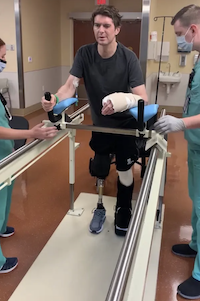
Since then, so many people helped me when I was injured. I spoke to veterans who’d been injured, and they would come to my bedside and say, “Don’t you worry. You will be up and you will be walking. You’re gonna be fine.” They really inspired me. If I can pass on a little bit of that inspiration to other people who might be going through something, then that’s what I want to do.
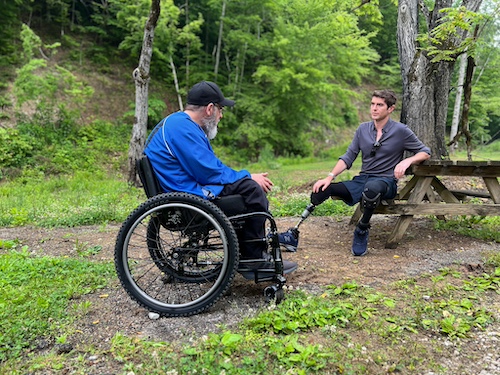
I do think that I must now live for those who died that day and that I must challenge what I do for them. However they would have lived their lives, the good that Pierre and Sasha would have done, I wanna go and try and do that myself. So I do think about it a lot, but I make it drive me to be better, make it drive me to go into things that I think would inspire them and make them happy.
“I do think that I must now live for those who died that day and that I must challenge what I do for them. I make it drive me to be better, make it drive me to go into things that I think would inspire them and make them happy.” – Benjamin Hall
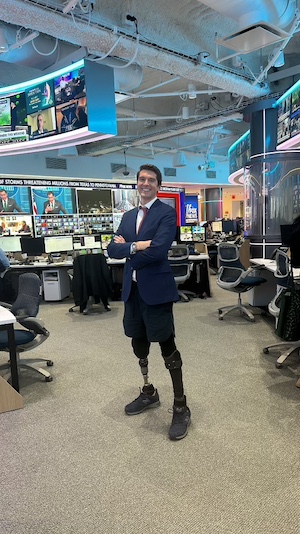
I honestly think that through everything I’ve been through, I am a stronger person because of it. I now know that there isn’t a challenge you can throw my way that I won’t find a way through. You mustn’t let fear disable you. You’ve got to address it, but also not run from it. I think that the worst thing you can do is hide from them, run from them, pretend they didn’t happen. You gotta look straight at them, and you gotta say, “I’m gonna get through you.”
“You mustn’t let fear disable you. You’ve got to address it, but also not run from it. I think that the worst thing you can do is hide from them, run from them, pretend they didn’t happen.” – Benjamin Hall
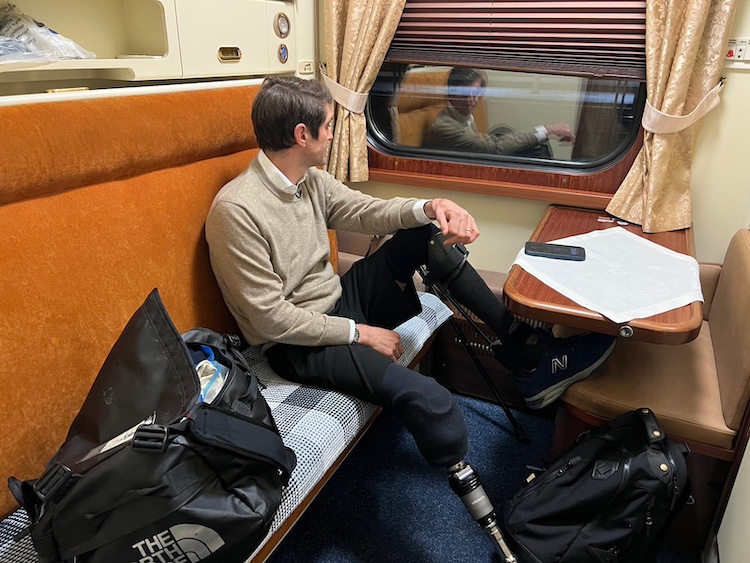
A year and a half later on my prosthetic legs, I took the same train, and I laid down in the same way when I went back. I wanted to relive all those memories because I don’t want to forget them. They are who I am. They are something that define me.
Everyone has difficulties, whether they’re financial problems, whether it’s family problems, whether it’s anxiety, all these things exist. I think that if you look at them in the same way, you can find ways through them. And I honestly believe that resilience is in absolutely everyone. We are survival machines—humans. If you can channel your feelings, if you can talk to God, if you can find the strength you need, you can get through absolutely anything.
“We are survival machines—humans. If you can channel your feelings, if you can talk to God, if you can find the strength you need, you can get through absolutely anything.” – Benjamin Hall
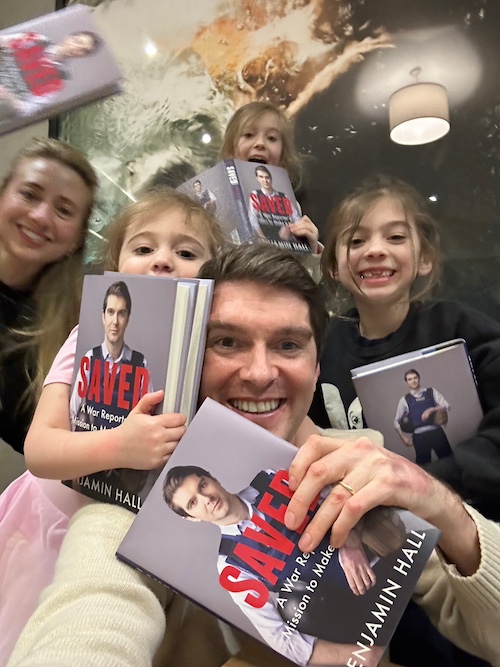
Everyone has resilience. I suppose what’s difficult is learning how to really use it. It’s about learning how to activate your mind so that you can focus on what you can get through. That, I suppose, is why I wrote my book, Resolute. It’s to try and talk through how I managed to get through what might seem like some of the hardest times of one’s life, but I did so always with optimism. I was always hopeful. I was always smiling. I always managed to find the beauty in every day while acknowledging the loss. I think that’s something that is so important for people to learn—how to balance those two things in your life and not let the loss overwhelm you, but how to let the positive really guide you.
“Everyone has resilience. I suppose what’s difficult is learning how to really use it. I always managed to find the beauty in every day while acknowledging the loss. I think that’s something that is so important for people to learn—how to balance those two things in your life and not let the loss overwhelm you, but how to let the positive really guide you.” – Benjamin Hall
Surviving “The Valley of the Shadow of Death”
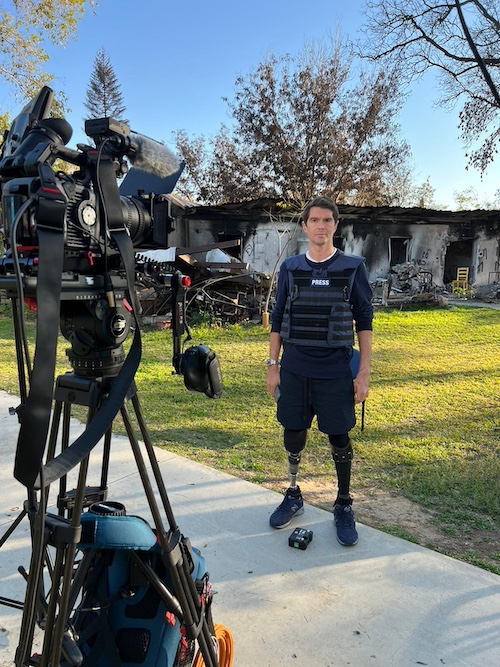
I was raised a strict Catholic, and for much of my life, that’s what defined every decision I made. I was covering conflicts, and I think many people’s religion sometimes goes on journeys, and there are times when I questioned religion. I stopped going to church for a little bit. I just started to think, Maybe religion isn’t the best solution. And I remember going to this beautiful church in northwestern Iraq which had been totally bombed and fallen apart, all that was left was this altar with this crucifix on it. It was one of those moments that my religion just came flying back to me again. It just stood there, this crucifix in the middle of this war zone where everyone was trying to destroy it and obliterate it, but it stood strong. It was one of those moments that I started to rebuild my religion.
But then, after the attack in Ukraine, I had some questions as well for God. I was thinking, How can God allow this to happen? I started speaking to one of the chaplains at the Brooke Army Medical Center, and we had a lot of discussions about what role religion can play and how you have two options. One is to run from it and the other is just to embrace it, and to understand that everyone’s journey is different and try and find the positives in it and try and talk to God through it.
“[The chaplain and I] had a lot of discussions about what role religion can play and how you have two options. One is to run from it and the other is just to embrace it, and to understand that everyone’s journey is different and try and find the positives in it and try and talk to God through it.” – Benjamin Hall

In Psalm 23, there are the lines in it that say, “Yea, though I walk in the valley of the shadow of death, I shall fear no evil. For Thou art with me, Thy staff and Thy rod, they comfort me.” I almost felt that I had been walking in the valley of the shadow of death, and yet I came out of it stronger. I think back to those lines all the time when I’m having difficult moments and that just inspires me.
I’ll be reading an excerpt from Jesus Listens, April 20th:
Almighty God,
Your Word tells me that You will fight for me; I need only to be still. Lord, You know how weary I am. I’ve been struggling just to keep my head above water, and my strength is running low. I need to stop trying so hard—and just let You fight for me.
This is very difficult for me to do because my feelings tell me I must keep striving in order to survive. But I know You’re working on my behalf, and You are calling me to rest in You. So please help me to be still and know that You are God.
In Your invincible Name, Jesus,
Amen
Narrator: To learn more about Benjamin Hall, be sure to check out his new book, Resolute: How We Humans Keep Finding Ways to Beat the Toughest Odds, at your favorite retailer.
Stay tuned to Chris Janssen’s story after a brief message.
The Jesus Calling Commemorative Edition
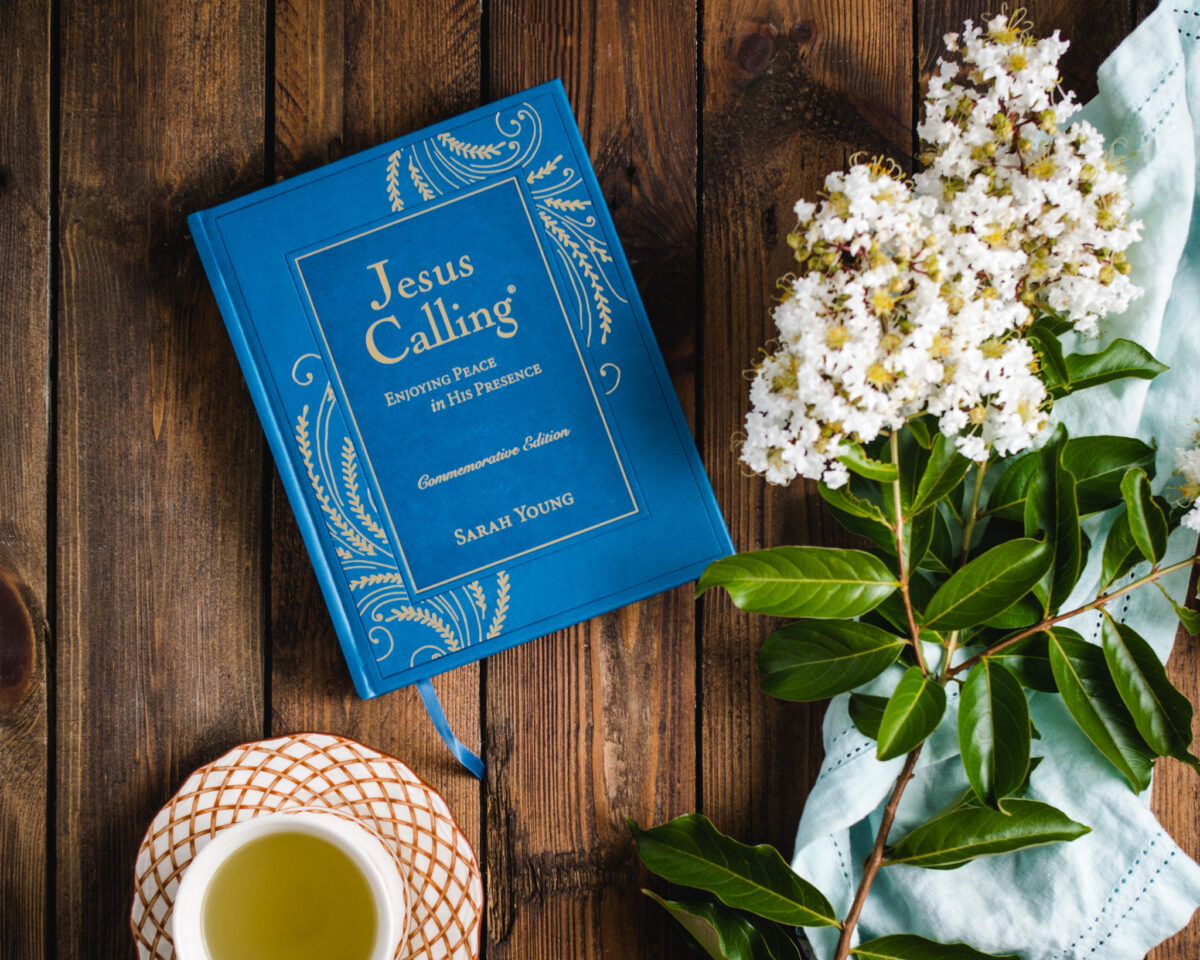
For over twenty years, readers have discovered the joy of spending time in the presence of the Savior with the much-loved daily devotions in Jesus Calling.
Now, in the Jesus Calling commemorative edition, you’ll feel comforted by words of hope and encouragement, and be reassured of Jesus’ unending love through author Sarah Young’s words of gentle guidance that are rooted in Scripture.
In this deluxe edition, you’ll find samples of Sarah’s original handwritten devotionals, twelve new devotions she penned before her passing, letters from Sarah to readers for each month of the year, and a touching tribute from Sarah’s daughter.
Experience a deeper relationship with Jesus as you savor the presence of the One who understands you perfectly and loves you forever. Find the Jesus Calling commemorative edition today at your favorite retailer or get 30% off your purchase at www.faithgateway.com.
Our next guest is author and life coach Chris Janssen. Chris shares her powerful story of sobriety, revealing how she concealed her addiction in plain sight for years before her faith led her to the path of recovery. Through both successes and setbacks, she has gained deep wisdom, which she now uses to help others find healing.
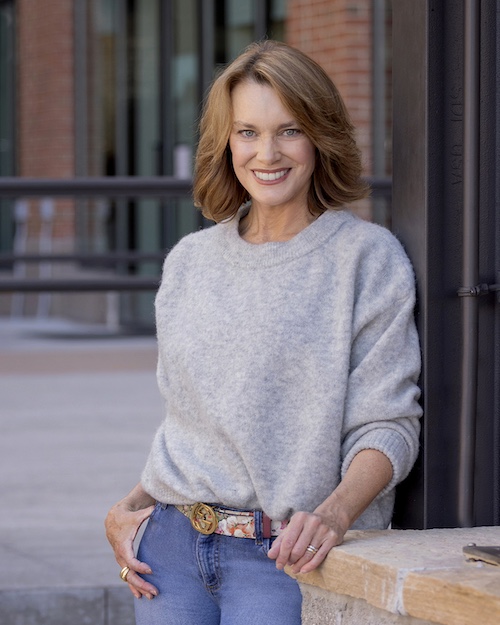
Chris Janssen: Hi, my name’s Chris Janssen. I am a wife, a mom to three adult children, and I’m also an author and a board certified life coach, and I’ve been doing that for the last several years. My mission in life is to encourage God’s people to know their self-worth, and I do that through writing and coaching.
Functioning With a Secret Addiction
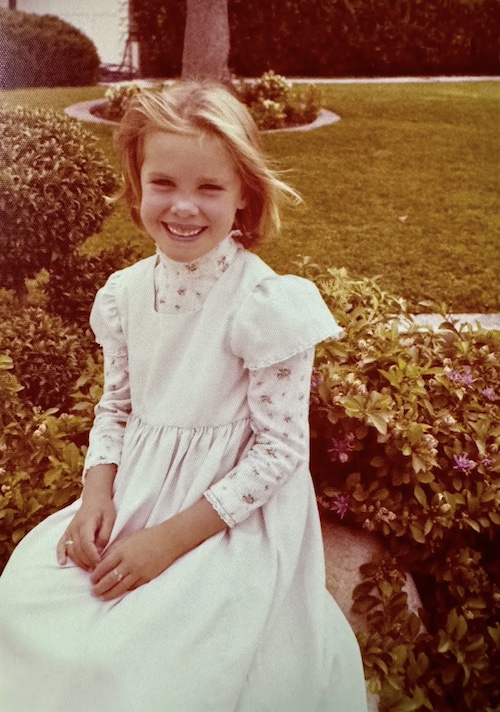
Growing up, I had a wonderful childhood, actually. It was my mom and dad. They’re still living. I have a younger brother, and we’re all still very close. I say that because since we are talking about addiction and alcohol addiction, a lot of people ask me that question, “Is it inherited? Is it genetic?” I’m not a doctor. I don’t know. I just think anybody, regardless of how you grew up, can get caught in the snare of addiction.
“I just think anybody, regardless of how you grew up, can get caught in the snare of addiction.” – Chris Janssen
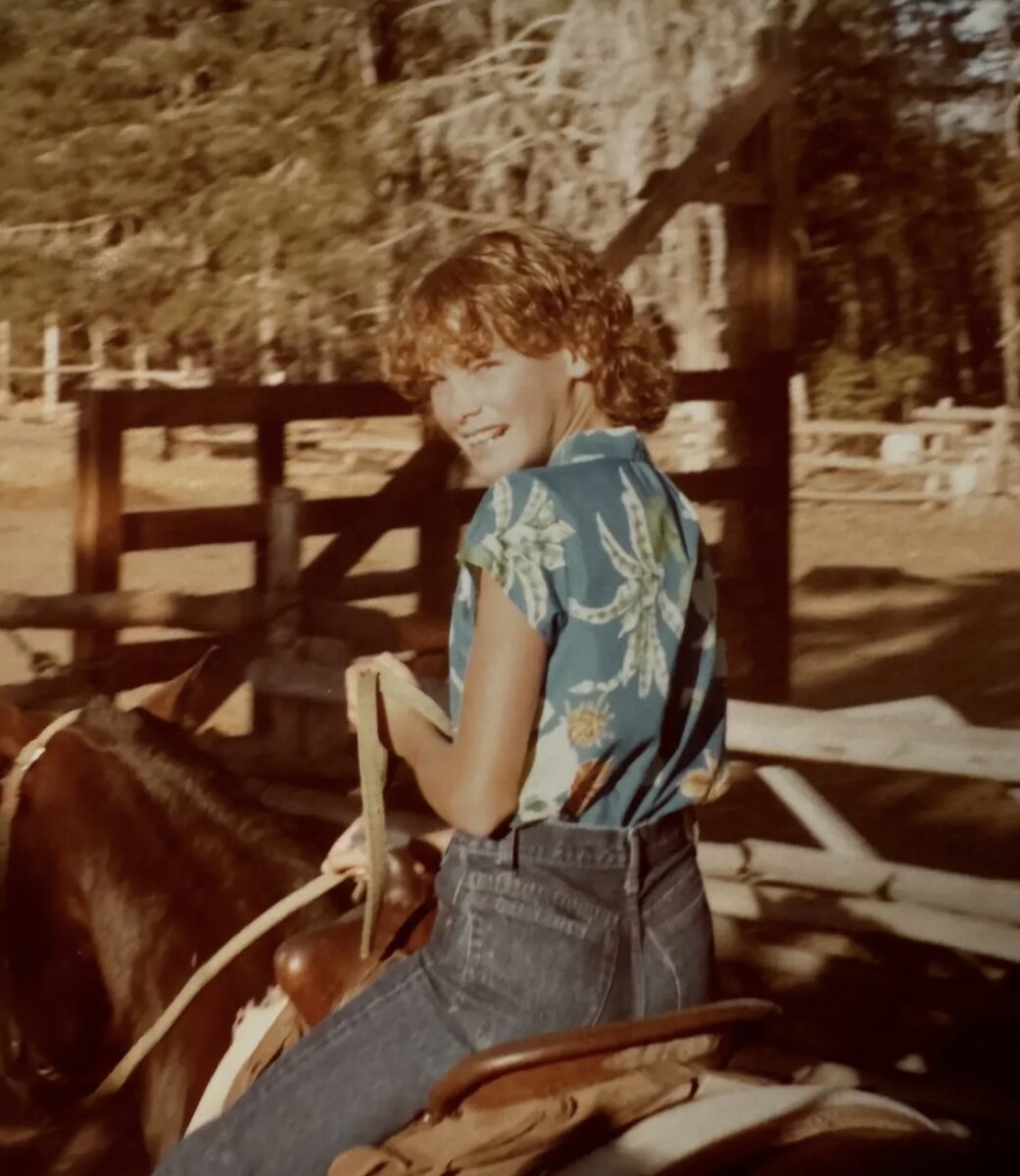
I realized alcohol was a problem immediately after I tried it for the first time. I was a freshman in high school. We were at a gathering on the side of the road with upperclassmen, and I tried beer. I was a very perfectionistic child. I was a rigid thinker. I lived in my head. So when I had a sip of alcohol, it was very magical. It was like it just took all of that being in my head, being so focused on things that really weren’t serving me, and it just relaxed me. It made me feel okay. It changed my state and made me feel calm, and that’s great, but it’s not sustainable. After I tried alcohol for the first time, I kept drinking socially with friends. I knew it wasn’t good for me. I hated the way I felt the next day. I heaped a ton of shame and guilt on myself for it.
I had tried probably for twenty-four years from the time I first tried it as a freshman in high school until I was thirty-seven years old to become a non-drinker on my own. But when I was thirty-seven, I just knew it had grown to where I knew it was a problem. It did not look like I had a problem—I had three babies, I was an athlete, and I was really good at these other things in life. So nobody was telling me. I asked my pastor, a doctor, a therapist, my husband, my good friends, “Do you think I have a problem?” because I was pretty sure I did and everybody’s answer was like, “Oh honey, no, you don’t need recovery. You don’t need that. You don’t have a problem.” That was the problem—I knew in my gut that it was going to kill me. I was that housewife at home drinking too much while I was doing the dishes or cleaning up. I knew I couldn’t do it, but I also didn’t know what to do about it.
Recovery Can Be Two Steps Forward, One Step Back
It was Divine intervention. I felt God leading me to look up online what to do for help one night. I went to a women’s meeting the next day and that’s when my recovery started. Everything changed for me, because in that meeting, a woman in the group who knew it was my first time said to me, “It’s not your fault. It’s like an allergy.” She said, “You’re an alcoholic. It’s like an allergy and you never have to have another drink again.” In that moment, all the shame and guilt flew off my shoulders, and my belief changed from I’m a monster to I’m deserving of recovery and community and sobriety because I’m addicted to alcohol. That started a journey of recovery that changed my whole life.
“All the shame and guilt flew off my shoulders, and my belief changed from I’m a monster to I’m deserving of recovery and community and sobriety because I’m addicted to alcohol.” – Chris Janssen
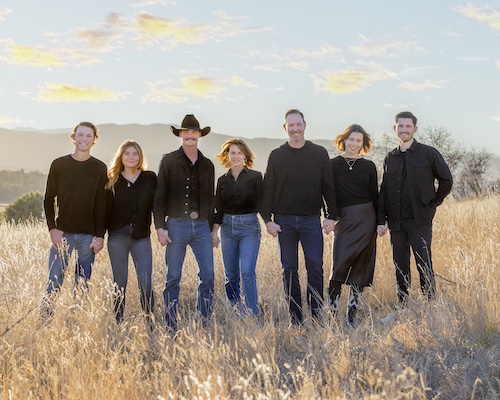
Just shy of fourteen years, I never took another sip of alcohol again. I worked a program of recovery, and I had friends in recovery, and I stayed close to my sober community. In 2020 we were in quarantine when the pandemic had hit—I’d always lived in the same state my whole life, California—we decided to move to Colorado. We were brand new empty nesters. I went and tried to get plugged into a recovery community in my new town, and I couldn’t find one right away.
And so after thirteen and a half years, I started to take that for granted that my recovery program and sobriety was magical. It was life-giving—like a person who takes a vitamin to feel better and they feel better and then they think they don’t need the vitamin anymore. That was me.
So I did invite alcohol back into my life. I think that’s important to note, because from that story, you can see it wasn’t like a low note. I went out on a high note. I wasn’t depressed. No big traumatic thing had happened, and then I drank. Life was better than it had ever been, and I just thought, I could have it all.
I thought, Well, I just need to do it better or build my tolerance. That’s just such cuckoo thinking, it’s so backwards, because the more you work at it with a toxic substance like that, you don’t build your tolerance. It’s a progressive condition, and it gets worse with age and over time. It just got worse, and then I really did have an ugly bottom where there were some bad episodes, and the last time I drank, I am very lucky I didn’t die. Immediately, the day after that, I went back to the recovery community and with fresh eyes, right? It was definitely the place for me. I felt like that was family. I was home. And people in recovery, they are not full of shame. That’s a beautiful thing.
Food for Thought & Soul
To me, physical wellness leads to emotional wellness for me. I run or work out or walk or hike. I stay connected to both my recovery community and my church community and my girlfriends and prayer every day. My quiet time is really important for me—that quiet time and then also the listening time. My routine is I’ll pray and then I’ll go on a run. During the run, I just let my mind listen. I keep little voice memos on my phone, and when I hear things that I know are from the Holy Spirit, I put them in there and write them down.
“To me, physical wellness leads to emotional wellness.” – Chris Janssen
Jesus Calling is a beautiful piece of work. It helps us readers to get our prayer life jumpstarted, really, for the day.
I love writing and journaling and healthy, good food is life-giving for me. I’m a highly sensitive person and body type, so I’m sure that plays into why I’m terrible at drinking alcohol. But it also plays into [the fact] that it’s really important for me to stay healthy physically in order to stay healthy mentally and emotionally. The way I describe sobriety is more than abstinence—it’s a lifestyle, not an event. I don’t believe I’m giving something up by sobriety, I’m gaining something. And what’s gained is my life, my memories, my presence with people, my ability to have fun. I love having fun. I love laughing. I would say I’m funny. That all goes away if I drink alcohol. I’m sad, I’m depressed, I’m not fun. I might be for twenty minutes or maybe a few hours, [but] it was so the opposite of fun afterwards.
“The way I describe sobriety is more than abstinence—it’s a lifestyle, not an event. I don’t believe I’m giving something up by sobriety, I’m gaining something. And what’s gained is my life, my memories, my presence with people, my ability to have fun.” – Chris Janssen
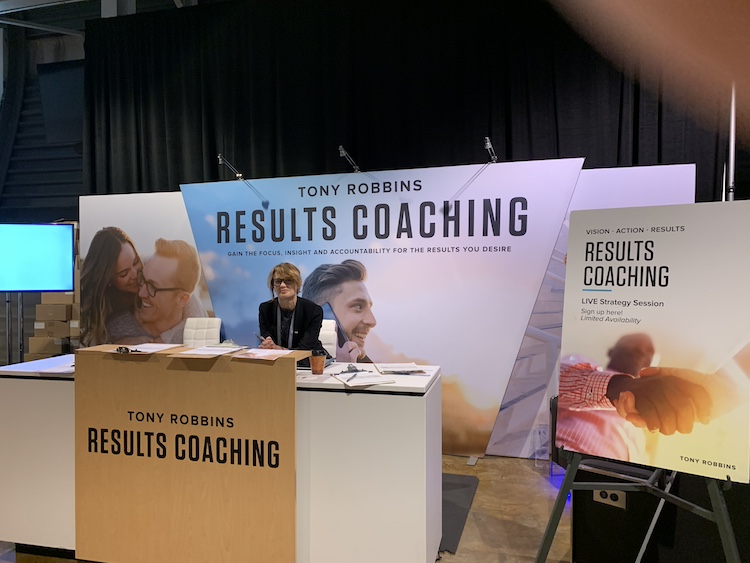
I’m not going to lie and say it’s not fun when I went out to have a drink—I probably had some fun nights. It’s just miserable though over the long run, and it’s not sustainable. When I work with clients, I’m big on leverage and always asking, “What are the costs and benefits of these behaviors or thoughts or decisions that we make? Be honest about it. What’s the cost of it? What’s the cost of not drinking?” Okay, well, there might be a few costs with that, but then let’s write down the costs of drinking. The costs for me are far more of doing the thing. That’s what I like to stay focused on and what I want to help other people stay focused on.
God says we have grace. He says we’re valuable and we’re worthy. And I know for me, as a young person, I tried to control that. I didn’t understand God’s grace because I thought, I’ll tell you what I deserve and what I don’t deserve. I’ll tell you if I’m worthy or not. I felt like everything I did, I had to earn it, and that’s the opposite of grace. When we live in that mindset of control, we’re unable to accept grace. We’re taking control of our own worthiness, and we don’t get to do that. We just don’t. God has said we’re worthy and valuable no matter what.
“I felt like everything I did, I had to earn it, and that’s the opposite of grace. When we live in that mindset of control, we’re unable to accept grace. We’re taking control of our own worthiness, and we don’t get to do that. God has said we’re worthy and valuable no matter what.” – Chris Janssen
Narrator: To learn more about Chris Janssen, visit www.chrisjanssencoaching.com, and be sure to check out her new book, Grace Yourself: How to Show Up for the Sober Life You Want, at your favorite retailer.
If you’d like to hear more stories about finding strength during a struggle, check out our interview with Natalie Grant.
Next week: Jared Orton
Next time on the Jesus Calling Podcast, we’ll hear from Jared Orton, the president of the Savannah Bananas, the viral sensation baseball team taking the world of sports entertainment to a whole new level. Jared shares about the servant focus of the organization and how they’re seeking to bring joy to everyone they come in contact with.
Jared Orton: We do feel like we’re in this position for a reason, and hopefully for a very long time, to be the stewards of something that’s really special in the earth. To be able to use this platform, this team, this group of people we work with and the community that we’re in, the people that we serve, the people we’re able to now be around, in a way that glorifies God, advances the kingdom, and really shares love of Christ with people.
